Complete Solutions to QUESTIONS FROM PREVIOUS ICSE BOARD PAPERS of chapter STUDY OF COMPOUNDS OF CHLORINE - HYDROGEN CHLORIDE of Class 10 book with complete answers and questions
| Class 10 | CHEMISTRY |
| Chapter | STUDY OF COMPOUNDS OF CHLORINE - HYDROGEN CHLORIDE |
| EVERGREEN PUBLICATION | QUESTIONS FROM PREVIOUS ICSE BOARD PAPERS |
| Number Of Questions | 74 |
| Academic Year | 2023-24 |
State one observation each for the following: Manganese dioxide is heated with conc. HCI.
View SolutionState one observation each for the following: Silver nitrate solution is added to dilute hydrochloric acid.
View SolutionName the experiment illustrated by the diagram.
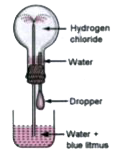
View SolutionWhich property of hydrogen chloride is demonstrated by this experiment?
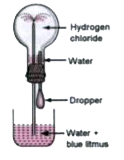
View SolutionState the colour of water that has entered the round bottomed flask.
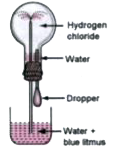
View SolutionWrite balanced equations for the following reactions:
copper oxide and dilute hydrochloric acid.
View SolutionWrite balanced equations for the following reactions:
manganese (IV) oxide and conc. Hydrochloric acid.
View SolutionWrite balanced equation for the reaction of zinc and dilute hydrochloric acid.
View SolutionState what is observed when hydrochloric acid is added to silver nitrate solution.
View SolutionName the compound which can be oxidised to chlorine.
View SolutionYou enter a laboratory after a class has completed the Fountain Experiment. How will you be able to tell whether the gas used in the experiment was hydrogen chloride or ammonia ?
View SolutionWrite balanced equations for the reaction of dilute hydrochloric acid with iron.
View SolutionWrite balanced equations for the reaction of dilute hydrochloric acid with each of the following: sodium hydrogencarbonate.
View SolutionWrite balanced equations for the reaction of dilute hydrochloric acid with each of the following: iron(II) sulphide.
View SolutionWrite balanced equations for the reaction of dilute hydrochloric acid with each of the following: sodium sulphite.
View SolutionWrite balanced equations for the reaction of dilute hydrochloric acid with each of the following: sodium thiosulphate solution.
View SolutionWhat property of hydrogen chloride is demonstrated when it is collected by downward delivery (upward displacement)?
View SolutionWhy is hydrogen chloride not collected over water ?
View SolutionWrite equations for the following:
Dilute hydrochloric acid and sodium thiosulphate.
View SolutionWrite equations for the following:
Dilute hydrochloric acid and lead nitrate.
View SolutionWrite a fully balanced equation for each of the following cases : Red lead is warmed with concentrated hydrochloric acid.
View SolutionWrite a fully balanced equation for each of the following cases : Magnesium metal is treated with dilute hydrochloric acid.
View SolutionCorrect the following statements.
For example : "Chlorine is a bleaching agent'.
Should read : 'Moist chlorine is a bleaching agent'.
Hydrochloric acid is prepared in the laboratory by passing hydrogen chloride directly through water.
View SolutionThe diagram shows an apparatus for the laboratory preparation of hydrogen chloride.
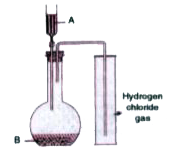
Identify A and B.
View SolutionThe diagram shows an apparatus for the laboratory preparation of hydrogen chloride.
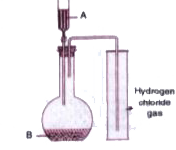
Write the equation for the reaction.
View SolutionThe diagram shows an apparatus for the laboratory preparation of hydrogen chloride.
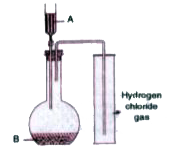
How would you check whether or not the gas jar is filled with hydrogen chloride ?
View SolutionThe diagram shows an apparatus for the laboratory preparation of hydrogen chloride.
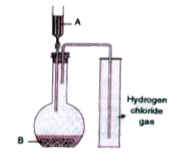
What does the method of collection tell you about the density of hydrogen chloride ?
View SolutionThe diagram shows a simple arrangement of the fountain experiment:
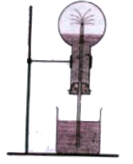
Name the two gases you have studied which can be used in this experiment.
View SolutionThe diagram shows a simple arrangement of the fountain experiment:
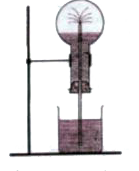
What is the common property demonstrated by this experiment?
View SolutionChoose the correct answer from the options given below:
Hydrogen chloride gas being highly soluble in water is dried by:
View SolutionWrite the balanced chemical equation for each of the following reactions :
Sodium thiosulphate is reacted with dilute hydrochloric acid.
View SolutionWrite the balanced chemical equation for each of the following reactions :
Calcium bicarbonate reacts with dilute hydrochloric acid.
View SolutionIn the laboratory preparation of hydrochloric acid, HCl gas is dissolved in water.
Draw a diagram to show the arrangement used for the absorption of HCI in water.
View SolutionIn the laboratory preparation of hydrochloric acid, HCl gas is dissolved in water.
Why is such an arrangement necessary ? Give two reasons.
View SolutionIn the laboratory preparation of hydrochloric acid, HCl gas is dissolved in water.
Write the chemical equations for the laboratory preparation of HCl gas when the reactants are:
(A) below `200^@C` (B) above `200^@C`
View SolutionSome word/words are missing in the following statements. You are required to rewrite the statements in the correct form using the appropriate word/words:
Aqua regia contains one part by volume of nitric acid and three parts by volume of hydrochloric acid.
View SolutionGive reason for the following:
Hydrogen chloride gas cannot be dried over quick lime.
View SolutionGive Balanced equations for the following
(i)Silver nitrate solution and Sodium chloride solution.
(ii)Concentrated hydrochloric acid and Potassium permanganate solution.
View SolutionSilver nitrate solution and Sodium chloride solution.
Silver nitrate solution and Sodium chloride solution.
View SolutionIdentify the anion present in the following compound :
Compound L on reacting with Barium chloride solution gives a white precipitate insoluble in dilute hydrochloric acid or dilute nitric acid.
View SolutionRefer to the flow chart diagram below and give balanced equations with conditions, if any, for the following conversions A to D.

View SolutionIdentify the gas evolved in the following reactions when :
potassium sulphite is treated with dilute hydrochloric acid.
View SolutionIdentify the gas evolved in the following reactions when :
concentrated hydrochloric acid is made to react with manganese dioxide.
View SolutionState one appropriate observation for each of the following:
A few drops of dilute hydrochloric acid are added to silver nitrate solution, followed by addition of ammonium hydroxide solution.
View SolutionGive a chemical test to distinguish between the following pairs of chemicals:
Sodium chloride solution and Sodium nitrate solution.
View SolutionGive a chemical test to distinguish between the following pairs of compounds:
Hydrogen chloride gas and hydrogen sulphide gas.
View SolutionIdentify the following substance :
A gas which does not conduct electricity in the liquid state but conducts electricity when dissolved in water.
View SolutionFill in the blank from the choices given within bracket:
Quicklime is not used to dry HCI gas because ...... (CaO is alkaline, CaO is acidic, CaO is neutral)
View SolutionWrite balanced equation for the following:
(i) Action of dilute hydrochloric acid on sodium sulphide.
View SolutionState your observation in each of the following cases :
(i) When dilute hydrochloric acid is added to sodium carbonate crystals.
View SolutionStudy the figure given below and answer the questions that follow :
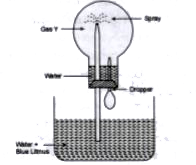
Identify the gas Y.
View SolutionStudy the figure given below and answer the questions that follow :
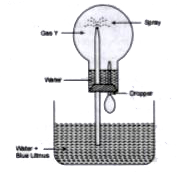
What property of gas Y does this experiment demonstrate ?
View SolutionStudy the figure given below and answer the questions that follow :
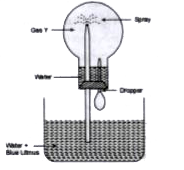
Name another gas which has the same property and can be demonstrated through this experiment.
View SolutionSelect from the list the gas that matches the description given in each case :
[ammonia, ethane, hydrogen chloride, hydrogen sulphide, ethyne]
This gas produces dense white fumes with ammonia gas.
View SolutionIdentify the acid which matches the following description (i) to (v):
The acid on mixing with silver nitrate solution produces a white precipitate which is soluble in excess ammonium hydroxide.
View SolutionThe following questions are pertaining to the laboratory preparation of hydrogen chloride gas :
Write the equation for its preparation mentioning the condition required.
View SolutionThe following questions are pertaining to the laboratory preparation of hydrogen chloride gas :
Name the drying agent used and justify your choice.
View SolutionThe following questions are pertaining to the laboratory preparation of hydrogen chloride gas :
State a safety precaution you would take during the preparation of hydrochloric acid.
View SolutionChoose the correct answer from the options given below:
(i) The aim of the Fountain Experiment is to prove that:
View SolutionWrite the balanced chemical equation for the following:
(1) Action of Hydrochloric acid on sodium bicarbonate.
(2) Identify the gas evolved and give the chemical test in each of the following cases : Dilute Hydrochloric acid is added to Lead nitrate solution and the mixture is heated.
View SolutionWrite the balanced chemical equation for the following:
(1) Action of Hydrochloric acid on sodium bicarbonate.
(2) Identify the gas evolved and give the chemical test in each of the following cases : Dilute Hydrochloric acid is added to Copper carbonate.
View SolutionWrite the balanced chemical equation for the following:
(1) Action of Hydrochloric acid on sodium bicarbonate.
(2) Dilute Hydrochloric acid is added to Sodium thiosulphate.
View SolutionState your observations when :
Dilute hydrochloric acid reacts with sodium sulphite.
View SolutionState your observations when :
Dilute hydrochloric acid reacts with iron (II) sulphide.
View SolutionState one relevant observation for the following reaction :
Action of dilute Hydrochloric acid on iron (II) sulphide.
View SolutionCertain blank spaces are left in the following table and these are labelled as A, B and C. Identify each of them.

View SolutionWrite a balanced chemical equation for the following:
of dilute hydrochloric acid on magnesium sulphite.
View SolutionState one relevant observation for the following:
Lead nitrate solution is mixed with dilute hydrochloric acid and heated.
View SolutionName the gas that is produced in the following case :
Action of dilute hydrochloric acid on sodium sulphide.
View SolutionFill up the blank with the correct choice given in bracket.
Dry hydrogen chloride gas can be collected by _________displacement of air. (downward/upward)
View SolutionName the acid used for the preparation of hydrogen chloride gas in the laboratory. Why is this particular acid preferred to other acids?
View SolutionWrite the balanced chemical equation for the laboratory preparation of hydrogen chloride gas.
View SolutionFor the preparation of hydrochloric acid in the laboratory :
Why is direct absorption of hydrogen chloride gas in water not feasible ?
View SolutionFor the preparation of hydrochloric acid in the laboratory 0=- I ] State why direct absorption of hydrogen gas in water is not feasible . Ii ] State what arrangement is used to dissolve hydrogen chloride gas in water.
View Solution
QUESTIONS FROM PREVIOUS ICSE BOARD PAPERS questions and complete solutions for chapter STUDY OF COMPOUNDS OF CHLORINE - HYDROGEN CHLORIDE of EVERGREEN CHEMISTRY (ENGLISH) of Class 10